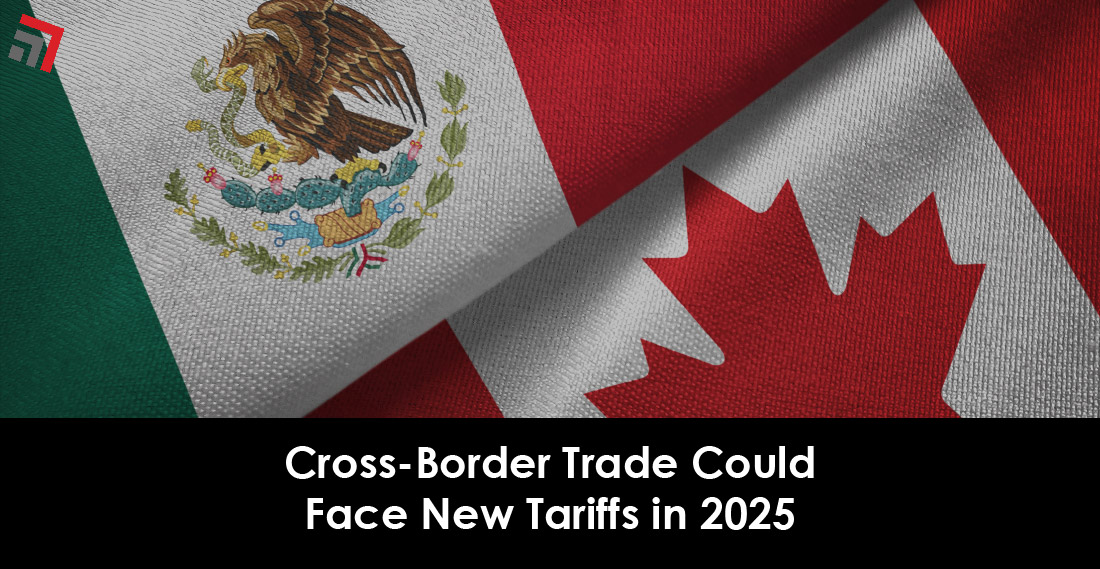With a familiar face returning to the White House for a second term, tariffs have been the talk of trade as of late. Just the other week, stakeholders were reminded of the incoming president’s fondness of tariffs as a form of trade diplomacy.
In late November, U.S. President-elect Donald Trump announced he plans to implement 25 percent tariffs on all goods coming into the country from Canada and Mexico when he takes office in January. The incoming president’s trade proposal is widely seen as an aggressive tactic to pressure neighboring countries in curbing the flow of migrants and illegal drugs coming across the two borders.
However, if tariffs are imposed, they will not burden the pockets of foreign governments or suppliers. Rather, they will come as a direct cost to the U.S. importer. Cross-border trade faces a degree of uncertainty as Trump heads for office in early 2025.
New tariff potential introduces new risk to cross-border supply chains
By definition, tariffs are taxes on foreign-made goods paid by the importing business to the home country’s government. While there are exceptions to how their amount can be calculated, tariffs are typically imposed as a fixed percentage of the value of the imports. In the case of Trump’s recent proposal, a 25 percent fee would be slapped onto all goods coming from Canada and Mexico.
For more frequent and larger volume shippers, a requirement to pay one fourth of the total value of an import shipment would become unsustainable if they do not adjust for the newfound cost. As a result, the price on final goods would increase, meaning U.S. consumers would have to pay more on products coming from Canada or Mexico.
That said, a sweeping tariff program would be a stunning development for U.S. industries who have invested in production and manufacturing across the border, specifically in Mexico. A trend known as nearshoring, the business strategy is intended to steer supply chains away from countries, mainly China, who are prone to volatile trade relations with the U.S.
Related: Is Nearshoring the New Offshoring?
Ironically, with the potential of Trump tariffs looming over, relocated supply chains are now susceptible to the risk they aimed to avoid in the first place—frayed trade relations. If the U.S. were to impose tariffs on its neighbors, Canada and Mexico would likely place their own on the U.S. This escalation would be the at expense of North American shippers and, ultimately, consumers.
So far, more than a week removed from Trump’s announcement, Canada Prime Minister Justin Trudeau and Mexico President Claudia Sheinbaum have had separate conversations with the president-elect. In response, Trump further lamented about issues at the border on social media, but acknowledged the conversations between both leaders were productive.
It remains unclear whether the incoming administration will actually move forward with the tariff proposal. Rather, political analysts say it simply could be a negotiating tactic used by Trump to achieve his policy goals.
Tariff uncertainty: Plan, don’t panic!
Amid this uncertainty, Commerce Express Inc. strongly advises cross-border shippers to plan ahead and discuss the potential of increased tariffs with trusted transportation providers. If company orders from either Canada or Mexico can be brought in before the incoming administration, it can be a straightforward way for shippers to avoid potential tariffs.
However, it is equally important not to panic. Shippers should not compromise the timing of their supply chains to frantically rush orders in. While frontloading cargo is a viable strategy if there is enough flexibility in one’s supply chain, it can also create problems of its own. A surplus of cargo could mean additional storage and warehouse fees.
Tariffs aside, cross-border shipping carries other complexities that supply chain professionals must account for. For more about cross-border shipping, our blog below is great place to start. Otherwise, if there are more specific questions or concerns about your company’s supply chain and/or the service solutions provided by Commerce Express Inc., an appropriate next step would be scheduling a meeting with our Strategic Development Manager Owen Campbell.
More information about cross-border shipping.




Recent Comments